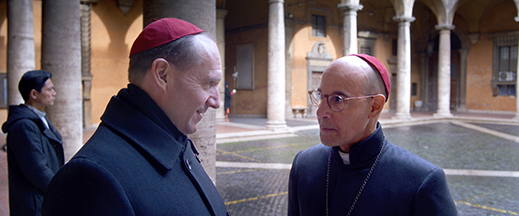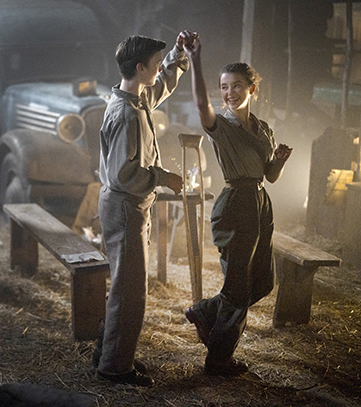Conclave
By John Mulderig
NEW YORK (OSV News) – A serious, even lugubrious, tone and a top-flight cast add heft to the ecclesiastical melodrama “Conclave” (Focus). Yet the film is fundamentally a power-struggle potboiler kept roiling by attention-grabbing plot developments the last and most significant of which Catholic viewers will likely find uncomfortable at best.
The story centers on Ralph Fiennes’ Cardinal Lawrence. In the wake of the sudden death of a fictional, unnamed pope (Bruno Novelli), it’s Lawrence’s duty as dean of the college of cardinals to organize the gathering of the title.

A trio of leading candidates for the papacy quickly emerges as down-to-earth liberal Cardinal Bellini (Stanley Tucci) vies with flamboyant conservative Cardinal Tedesco (Sergio Castellitto) as well as with Africa’s favorite son, the supposedly reactionary Cardinal Adeyemi (Lucian Msamati). A Canadian prelate, Cardinal Tremblay (John Lithgow), is also in the running.
As these favorites jockey for position, complications arise. Rumors swirl of shady behavior on the part of Cardinal Tremblay while an unexpected newcomer, Cardinal Benitez (Carlos Diehz), makes his mysterious presence felt. Benitez, the Archbishop of Kabul, Afghanistan, produces documentation that the late pontiff appointed him to the cardinalate but kept the matter secret.
Neither references to Lawrence’s shaky hold on his faith nor the clay feet several of his colleagues turn out to possess are cause for much alarm. But rival viewpoints within the church are caricatured with a broad brush in director Edward Berger’s adaptation of Robert Harris’ 2016 novel and the deck is predictably stacked in favor of those who advocate change.
As scripted by Peter Straughan, the movie gets canon law wrong, since promotions such as Benitez’s traditionally known as nominations “in pectore” (within the chest) are null and void if not publicly announced during the lifetime of the pope who made them. And Benedict XVI is implicitly slandered in the dialogue via an allusion to a past pontiff who fought for Hitler.
“Conclave” also traffics in sordid secrets of varying plausibility in the lead-up to a climactic revelation that many will find offensively exploitative, others merely loopy. Since this concerns a rare anatomical anomaly rather than any kind of lifestyle choice, its inclusion makes more of a symbolic statement than an ethical one either acceptable or otherwise.
Still, for all the delicacy and bet-hedging with which the matter is handled, it constitutes a characteristic instance of the way the picture elevates the pieties of the current zeitgeist over eternal truths. Thus Lawrence assures his peers early on that the ultimate sin is certainty.
Not only professors of dogmatic theology but all moviegoers committed to the church’s creeds will, accordingly, want to approach this earnest, visually engaging but manipulative and sometimes sensationalist production with caution. The ideological smoke it sends up remains persistently gray.
The film contains murky moral values, plot developments requiring mature discernment and a couple of mild oaths. The OSV News classification is L limited adult audience, films whose problematic content many adults would find troubling. The Motion Picture Association rating is PG parental guidance suggested. Some material may not be suitable for children.
White Bird
By John Mulderig
NEW YORK (OSV News) – Fans of the 2017 film “Wonder” may recognize the character of Julian Abans (Bryce Gheisar), a student on whose adjustment to a new school the opening scenes of the touching wartime drama “White Bird” (Lionsgate) focus. Julian was the bully who persecuted the facially deformed but heroic-hearted protagonist of the earlier movie.
Having been expelled for his misconduct, Julian is navigating his present environment and wavering between the proffered friendship of an outsider and the somewhat reluctant patronage offered to him by a callous member of the private academy’s elite. Opportunely, Julian’is grandmother, Sara (Helen Mirren), decides to intervene at this decisive point.

A celebrated artist visiting Julian’s native New York from Paris for a retrospective of her work, elderly Grandmere believes that Julian will profit from her own life lessons. So, in a series of flashbacks that make up the bulk of the story, she recounts to him for the first time the travails she endured as a young Jewish schoolgirl (Ariella Glaser) in occupied France.
Initially pampered at home and popular among her peers, youthful Sara is gifted but selfish and ethically neutral. Thus, although she refrains from joining in the persecution of her school’s main outcast, partially-crippled polio victim Julien Beaumier (Orlando Schwerdt), neither does she come to his defense. Instead, like most of those around her, she simply shuns him.
As the domination of her homeland progresses, however, Sara’s life and outlook change dramatically. Soon German soldiers are rounding up local Jews, both adults and children alike, and Sara is suddenly separated from her loving parents Max (Ishai Golan) and Rose (Olivia Ross) and forced to flee into the woods.
Desperate to stay one step ahead of her pursuers, Sara finds that the only person willing to come to her aid is Julien. Not only does he put himself at risk by helping her evade those hunting her down, he also provides her with long-term shelter in his family’s barn.
With the active help of his father (Jo Stone-Fewings) and mother (Gillian Anderson) who eventually come to regard Sara as their adoptive daughter Julien succeeds in concealing Sara over the weeks and months that follow. As the two youngsters mature, meanwhile, their bond of friendship is gradually transformed into a burgeoning romance.
A paean to kindliness and the power of imagination, director Marc Forster screen version of R.J. Palacio’s 2019 graphic novel “Wonder” was also based on Palacio’s work lacks subtlety at times. Yet, as scripted by Mark Bomback, “White Bird” effectively tugs at the heart by showcasing altruistic heroism in the face of dire evil.
The picture’s formative moral impact, moreover, outweighs its few problematic elements, making it a valuable experience for teens as well as grownups. Both age groups will find themselves rooting enthusiastically for the central pair and joining in the screenplay’s recurring slogan: “Vive l’humanite!”
The film contains mostly stylized violence with a few brief images of gore, mature themes including ethnic persecution, a single crude term and a couple of crass expressions. The OSV News classification is A-II adults and adolescents. The Motion Picture Association rating is PG-13 parents strongly cautioned. Some material may be inappropriate for children under 13.
(John Mulderig is media reviewer for OSV News. Follow him on X (formerly Twitter) @JohnMulderig1.)
